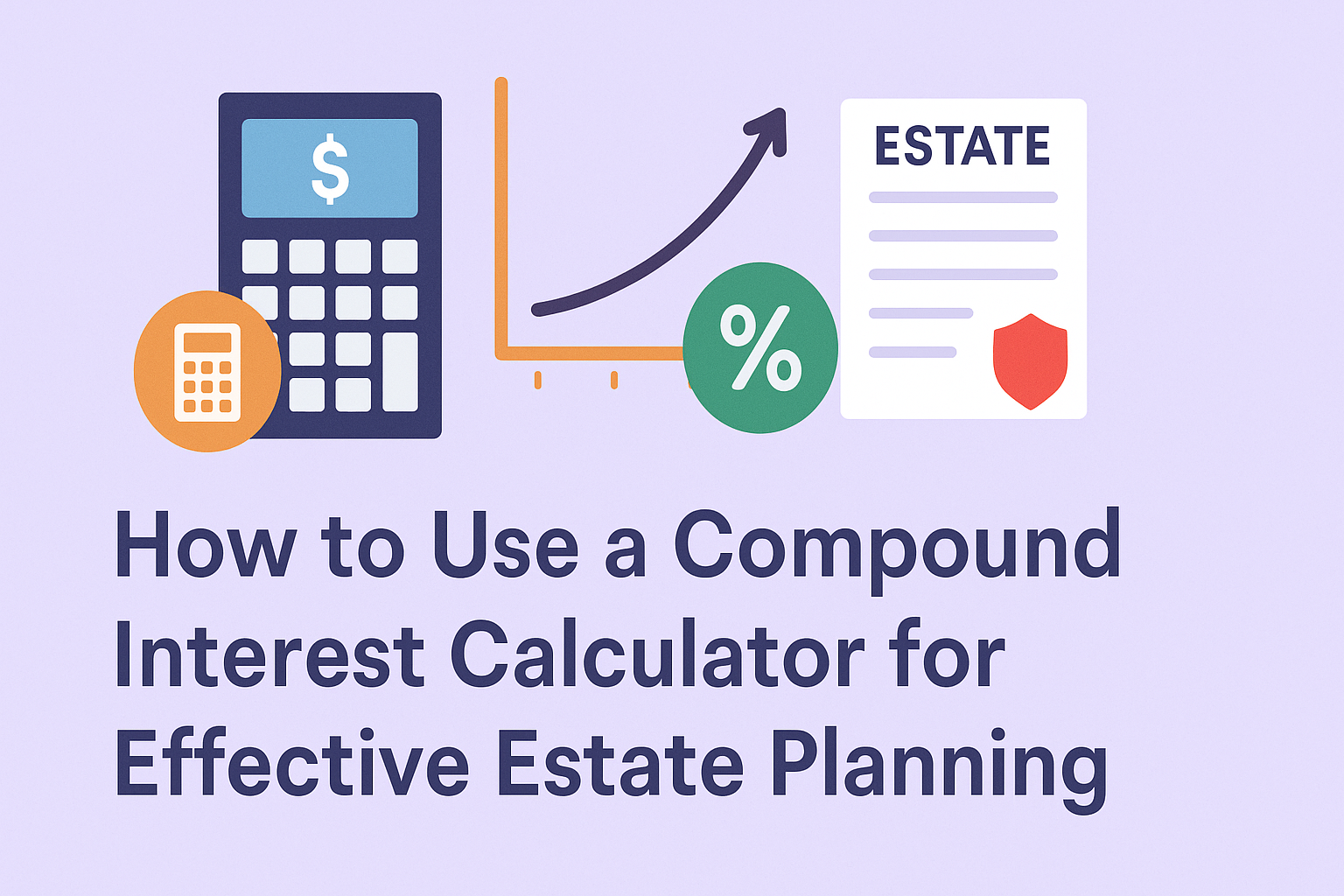Using a Compound Interest Calculator for Effective Estate Planning

Building Wealth Through Strategic Planning
When people think about estate planning, they often picture wills, trusts, and legal documents. While these are essential, the financial planning component is just as critical. One overlooked but powerful tool is the compound interest calculator. Used correctly, this tool can help visualize how your money grows over time—especially when paired with a high yield savings account or other interest-bearing vehicles.
Estate planning isn't just about distributing your assets; it's about growing them wisely. Understanding the principles of compound interest can significantly impact the size and security of your estate. In this article, we’ll break down how to use a compound interest calculator, why it's valuable in your estate plan, and how it fits into broader financial strategies.
What Is Compound Interest?
Compound interest is the process where interest earns interest. Unlike simple interest—which calculates interest only on the initial principal—compound interest calculates interest on both the principal and the accumulated interest over time. This concept is essential for long-term savings and investment strategies.
Example: If you invest $10,000 at a 5% annual interest rate compounded annually, after 30 years, you would have over $43,000. That's more than four times your original investment—purely through compounding.
How a Compound Interest Calculator Works
A compound interest calculator allows you to simulate how your investment or savings will grow based on variables like:
- Initial investment (principal)
- Contribution frequency (monthly, yearly, etc.)
- Interest rate
- Compounding frequency (daily, monthly, annually)
- Time horizon
Tip: Use a calculator with flexible input options to model real-life scenarios. For instance, Investor.gov’s Compound Interest Calculator is an excellent resource provided by the U.S. Securities and Exchange Commission.
Integrating Compound Interest into Estate Planning
Using a compound interest calculator is more than just an academic exercise. It helps you:
- Estimate how much wealth you can pass on.
- Set realistic savings goals for retirement and estate building.
- Compare options like IRAs, 401(k)s, and high yield savings accounts.
- Visualize the power of early and consistent investing.
Estate Planning with High Yield Savings Accounts
High yield savings accounts (HYSAs) can be a strategic component of your estate. These accounts often offer interest rates several times higher than traditional savings accounts, making them ideal for conservative growth.
Benefits of HYSAs:
- FDIC-insured for safety
- Liquidity for emergencies
- Passive, consistent interest income
Pairing a HYSA with regular contributions and using a compound interest calculator can help you forecast long-term outcomes. For example, contributing $500/month at a 4% annual interest rate compounded monthly can yield over $73,000 in 10 years.
Aligning with Your Estate Planning Checklist
Every effective estate plan should include a checklist to ensure no elements are missed. Here's how compound interest fits into that plan:
- Inventory of Assets: Include interest-bearing accounts and investments.
- Beneficiaries: Ensure your savings and investment accounts have updated beneficiary designations.
- Retirement Planning: Coordinate your retirement savings growth with your estate goals.
- Tax Strategies: Consider Roth IRAs or municipal bonds for tax-efficient compounding.
For a downloadable estate planning checklist, visit the BetterWealth And Asset Vault.
Common Misconceptions
"Compound interest only matters if you're rich." Not true. The earlier you start—even with small amounts—the more you benefit from compounding over time.
"My savings account compounds too slowly to matter." Many traditional accounts offer low rates, but HYSAs or investments in diversified ETFs can compound meaningfully over time.
"Estate planning is only for retirees." The earlier you plan, the more you can accumulate and protect.
Using Compound Interest for Intergenerational Wealth
When structured thoughtfully, compound interest strategies can provide long-term benefits for multiple generations. You can:
- Fund education accounts like 529 plans
- Set up custodial Roth IRAs for children
- Create living trusts that incorporate growth accounts
BetterWealth’s team often emphasizes the long-term impact of starting early, using the And Asset philosophy to integrate protection and growth. You can learn more about this at BetterWealth’s blog.
Next Steps
If you’re serious about optimizing your estate planning strategy, don’t overlook the power of compound interest. Whether through a high yield savings account, an IRA, or other interest-earning assets, compounding can significantly grow your estate over time.
Here’s what you can do today:
- Try a compound interest calculator with your current savings numbers.
- Consider opening or reviewing a HYSA.
- Schedule a conversation with a BetterWealth expert to explore how compounding fits into your estate strategy.





